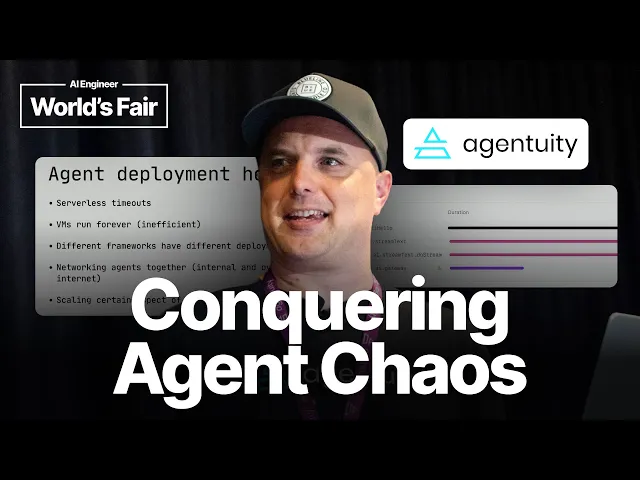Conquering Agent Chaos

Taming the chaos of agent development
In the rapidly evolving landscape of AI agent development, managing complexity has become the defining challenge for engineering teams. Rick Blalock's insightful presentation on "Conquering Agent Chaos" offers a compelling blueprint for organizations looking to bring order to their agent development processes. As businesses increasingly adopt AI agents for various applications, Blalock's structured approach provides crucial guidance for scaling these systems without descending into unmanageable chaos.
Key Points
-
Agent chaos manifests when organizations lack standardization across their development processes, leading to inconsistent implementations, security vulnerabilities, and maintenance nightmares
-
The "House of Order" framework provides a structured approach to agent development with five key pillars: governance, standards, patterns, tools, and templates
-
Executive buy-in and developer experience are equally critical to successfully implementing standardized agent development practices
The Path Through Complexity
The most compelling insight from Blalock's presentation is his acknowledgment that agent development exists on a spectrum from chaos to order. Rather than presenting an idealistic vision that ignores reality, he offers a pragmatic path forward. "It's not about achieving perfect order overnight," Blalock explains. "It's about progressively moving your organization from wherever you are on the spectrum toward greater standardization."
This perspective matters tremendously in today's AI landscape. Most enterprises are somewhere in the middle of this spectrum—neither completely chaotic nor perfectly ordered. According to recent research from Gartner, nearly 68% of organizations implementing AI initiatives struggle with inconsistent development practices, resulting in significant technical debt. By recognizing this reality and providing incremental steps toward improvement, Blalock's approach offers actionable guidance for companies at any stage of AI maturity.
Beyond the Presentation: Real-World Applications
While Blalock provides a solid theoretical framework, there are concrete examples worth exploring. Consider the case of a mid-sized financial services company that implemented a similar "house of order" approach to their chatbot development. Before standardization, they had twelve different teams building customer service agents using five different frameworks and three different LLM providers. The result was a maintenance nightmare with inconsistent user experiences across their digital properties.
By implementing governance councils, standardized patterns, and shared tool sets—similar to Bla
Recent Videos
How To Earn MONEY With Images (No Bullsh*t)
Smart earnings from your image collection In today's digital economy, passive income streams have become increasingly accessible to creators with various skill sets. A recent YouTube video cuts through the hype to explore legitimate ways photographers, designers, and even casual smartphone users can monetize their image collections. The strategies outlined don't rely on unrealistic promises or complicated schemes—instead, they focus on established marketplaces with proven revenue potential for image creators. Key Points Stock photography platforms like Shutterstock, Adobe Stock, and Getty Images remain viable income sources when you understand their specific requirements and optimize your submissions accordingly. Specialized marketplaces focusing...
Oct 3, 2025New SHAPE SHIFTING AI Robot Is Freaking People Out
Liquid robots will change everything In the quiet labs of Carnegie Mellon University, scientists have created something that feels plucked from science fiction—a magnetic slime robot that can transform between liquid and solid states, slipping through tight spaces before reassembling on the other side. This technology, showcased in a recent YouTube video, represents a significant leap beyond traditional robotics into a realm where machines mimic not just animal movements, but their fundamental physical properties. While the internet might be buzzing with dystopian concerns about "shape-shifting terminators," the reality offers far more promising applications that could revolutionize medicine, rescue operations, and...
Oct 3, 2025How To Do Homeless AI Tiktok Trend (Tiktok Homeless AI Tutorial)
AI homeless trend raises ethical concerns In an era where social media trends evolve faster than we can comprehend them, TikTok's "homeless AI" trend has sparked both creative engagement and serious ethical questions. The trend, which involves using AI to transform ordinary photos into images depicting homelessness, has rapidly gained traction across the platform, with creators eagerly jumping on board to showcase their digital transformations. While the technical process is relatively straightforward, the implications of digitally "becoming homeless" for entertainment deserve careful consideration. The video tutorial provides a step-by-step guide on creating these AI-generated images, explaining how users can transform...
